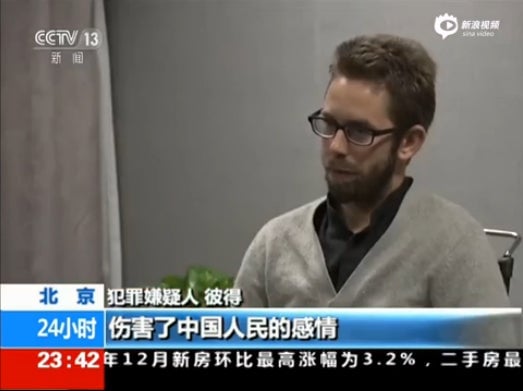Video: A Swedish human rights activist’s “forced confession” on Chinese national television
Swedish human rights worker Peter Dahlin, who disappeared on Jan. 3 on his way to Beijing’s international airport, reappeared on China’s state broadcaster on Jan. 19, where he confessed to “endangering state security,” and apologized for hurting Chinese people’s feelings.


Swedish human rights worker Peter Dahlin, who disappeared on Jan. 3 on his way to Beijing’s international airport, reappeared on China’s state broadcaster on Jan. 19, where he confessed to “endangering state security,” and apologized for hurting Chinese people’s feelings.
His confession, which is believed by his colleagues to be forced, is the latest example of Beijing’s heavy-handed crackdown on human rights lawyers and activists, and use of televised confessions to shame individuals it believes are working against the best interests of the government.
Dahlin, 35, is a co-founder of the Beijing-based NGO Chinese Urgent Action Working Group. The organization trains rural lawyers in human rights, to fight violations of “unlawful behavior by local government,” among other things. Dahlin has been in Chinese custody since he disappeared, and was denied a visit from a Swedish government representative for more than a week.
He reappeared on national broadcaster CCTV, in an eight-minute video:
“I violated Chinese law through my activities here, I’ve caused harm to the Chinese government, I’ve hurt the feelings of the Chinese people,” Dahlin said to the camera, “I apologize sincerely for this and I regret that this ever happened.”
Dahlin, who spoke in English, looked calm but sounded as if he was reading from a script. In the video, he said he “once supported” (translated into “funded” in the Chinese subtitles) lawyers who are accused of violating Chinese laws, including Xing Qingxian, who is accused of smuggling the 16-year-old son of Wang Yu, a detained lawyer from Beijing Fengrui law firm, overseas, and Wang Quanzhang, who has been charged with “subversion of state power.”
Dahlin also detailed how much he pays lawyers who work with him, from 3,000 yuan ($456) per month for citizen lawyers, to 20,000 yuan per case for those who “take on difficult cases.” Dahlin didn’t specify what these cases are. A narrator on the video said Dahlin admitted that a foreign NGO has asked his group to file no less than 96 cases per year against the Chinese government, but Dahlin is not filmed saying this.
In the video, Dahlin, who suffers from Addison’s disease, a rare endocrine disorder that requires daily medication, said his “unique medical condition” has been “considered,” and has been given “good food and plenty of sleep.” He said: “I have no complaints to make.”
According to CCTV’s narration, Dahlin also admitted to fabricating reports on China’s human rights to overseas NGOs and embezzling money he received from them, but he does not say that himself. CCTV said Dahlin’s group exaggerated or fabricated reports on China’s human rights and said Dahlin admitted that he only gathered information online and could not verify if was true or not. A Xinhua report (link in Chinese) on the same day made the same accusations. Dahlin’s group trained lawyers and activists to “instigate people to confront the government and produce mass incidents,” Xinhua said.
Two men with their faces obscured also appeared on the broadcast, and were identified as Dahlin’s colleagues. The activist group “is watching for chances to provoke incidents,” a member only identified by his surname Wang said. “When the time is right, it will subvert our state power and our party’s rule.”
Xinhua said Dahlin was taken into custody on Jan. 3 and held in residential surveillance. It said the Swedish embassy visited Dahlin on Jan. 16.
Both Xinhua and CCTV said Wang Quanzhang, another detained lawyer from Fengrui, is also a partner in Dahlin’s group. Dahlin and Wang registered a company called Joint Development Institute Limited in Hong Kong in 2009, the report claims. It showed credit cards marked with Joint Development Institute’s name, and said that Peter received overseas funding of nearly 10 million yuan ($1.52 million) in recent years, and took half of that money himself. The funding came from seven overseas institutions, including one foreign NGO, the reports said.
The Chinese Urgent Action Working Group condemned the Chinese media for publishing an “apparent forced confession” in a statement on Jan. 20. The group called the accusations against him “baseless,” and confirmed Dahlin had finally met with the Swedish embassy.
His detention is part of a larger crackdown on human rights lawyers and activists in China. Over one weekend in July of 2015, Chinese authorities netted more than 100 lawyers and human rights defenders across the country, including associates with Beijing Fengrui law firm who later confessed to crimes on CCTV. After being held for six months, four lawyers and an assistant with Fengrui were formally arrested this January on suspicion of “subversion of state power,” according to Chinese Human Rights Defenders.
The partnership between Dahlin’s group and Wang relates to “his past rights defense activities and has nothing to do with his [Wang’s] work at Fengrui Law Firm,” Chinese Urgent Action Working group spokesman Michael Caster told Quartz in an email.
Chinese authorities are also holding another Swedish national, publisher Gui Minhai, who appeared this week on national television to confess a 12-year-old crime—a confession many also feel was forced.
The Swedish embassy told Quartz it has seen the reports and is “continuing to seek clarification from the Chinese authorities.” It confirmed the embassy has visited Dahlin, “at that time he was feeling well,” and “has access to the medications he needs.”
“We take a very serious view of the fact that the Chinese authorities have still not given us any clarification of what has happened,” the Swedish embassy said, regarding Gui’s case.